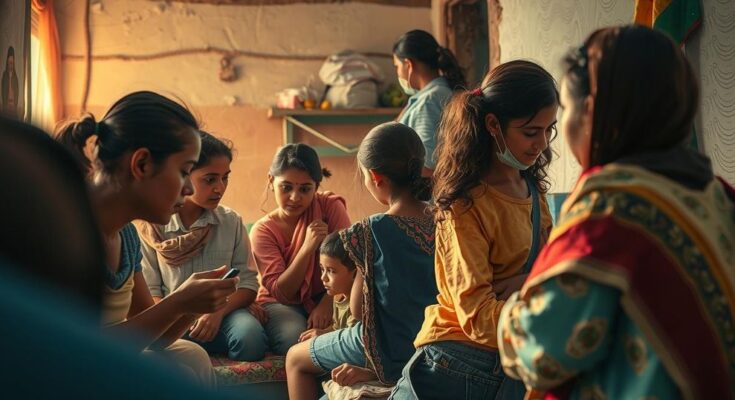In response to the dire humanitarian crisis in Sudan, grassroots activists have assumed the role of service providers, offering mental health support and assistance to families amidst ongoing violence. Despite operating in a challenging environment, these volunteers work to maintain vital services, highlighting the need for international aid and recognition of their efforts.
In a time of dire crisis, communities in war-torn Sudan are taking initiative to provide essential public services, a role vacated by collapsing state institutions. Grassroots activists focus on aiding families remaining in Sudan with vital support, such as mental health assistance through emergency response rooms (ERRs) and volunteer groups reuniting displaced individuals.
After two years of conflict between the Sudanese Armed Forces and the paramilitary Rapid Support Forces, humanitarian aid remains inconsistent, internet access is sporadic, and violence threatens civilian safety. In response, numerous volunteers, many of whom have endured the war themselves, have emerged to provide support, showcasing incredible resilience amidst adversity.
Maab Labib, a mental health coordinator at the Bahri Emergency Room, shared, “We provide free mental health services to individuals and groups who are victims of war.” Their team, comprised of 25 therapists and psychologists, has provided psychological support to over 1,500 individuals, extending their services beyond the capital to other affected regions.
The services offered are inclusive of all demographics. Labib emphasized, “Our services are not limited by age, gender or nationality.” Despite the war’s impact on caregivers, who also suffer from displacement and trauma, they continuously strive to support their communities through peer-to-peer emotional assistance.
The Bahri Emergency Room team is part of a broader network of mutual aid structures arising from the revolutionary climate of Sudan, providing communal kitchens, neighborhood support, and psychological first aid training. Guido Lanfranchi of the Clingendael Institute noted that these support networks represent a resilient spirit, vital for community endurance as state institutions disintegrate.
However, the mutual aid groups face significant dangers and scrutiny. Anette Hoffmann highlighted ongoing threats, stating, “Mutual aid groups are being attacked by both sides.” Laws have been enacted forbidding service committees, and accusations of collaboration with opposing forces have emerged, further complicating their efforts.
In stark contrast to the grassroots initiatives, the humanitarian situation continues to worsen, with the UN reporting that approximately 25 million people, more than half of Sudan’s population, require assistance. The recent withdrawal of USAID-funded programs has exacerbated the crisis, compelling numerous NGOs to halt operations and leaving local initiatives to shoulder the burden.
The Safe Haven Organization operates between Sudan and Chad, providing vital support to displaced families. Project manager Mozamul Mohammed Ali reported, “In Sudan, we supported 4,500 families a day through our kitchens,” but acknowledged that funding shortages have necessitated cuts to their services.
The organization has continually adapted its offerings, expanding from food provision to healthcare, mental health, and family reunifications. They have successfully located and reunified children separated from their families, such as a 9-year-old boy who had been lost for nearly a year.
Despite the chaotic circumstances in Sudan, Safe Haven’s efforts continue, led by local volunteers. However, the rise in trauma, particularly among women and children, remains troubling. Goma, a trauma center manager, shared concerns about increased mental health issues, noting, “There’s a significant rise in trauma-related disorders, especially among women and children.”
To combat stigma and enhance access to support, Safe Haven also trains community members in psychological first aid, emphasizing supportive practices. Despite the evident resilience within these grassroots organizations, leaders stress the growing complexity of community needs, imploring for sustained international support to address health services, education, and trauma care.
Lanfranchi pointed out the critical role of Sudan’s grassroots activists, remarking, “It’s a form of quiet political defiance.” Volunteers continue their work despite significant risks; as Ali concluded, “We are not heroes. We just couldn’t watch our people suffer without doing something.”
In conclusion, grassroots activists in Sudan exemplify resilience and determination as they strive to provide essential services amidst a humanitarian crisis. Despite facing severe challenges, including violence and resource shortages, these volunteers continue to support their communities, pushing back against state collapse through mutual aid initiatives. However, as the needs grow, they seek international recognition and assistance to sustain their efforts in delivering healthcare, education, and trauma support.
Original Source: www.arabnews.pk




